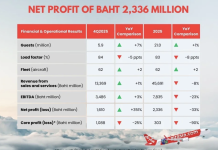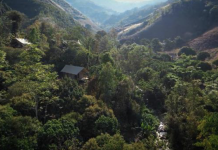BANGKOK, 11 June 2025: Thailand and Cambodia have imposed a seven-day stay limit on citizens of the two countries at land border checkpoints in a tit-for-tat response to a simmering border dispute; however, for airline travellers, the standard stay rules remain valid.
Since 9 June, the “seven-day stay rule” applies to just land trips between Thailand and Cambodia, and specifically for citizens of the two countries using border passes or passports at overland border crossings.
Thailand operates 17 official border crossings with Cambodia, spanning seven provinces along their shared 817 km border.
Land Travel
For Thais entering Cambodia by land, their visa validity has been shortened to seven days (from 14 days for passport holders and 15 days for border pass holders).
Cambodians entering Thailand by land have their stay in Thailand shortened to seven days (from 60 days for passport holders and 15 days for border pass holders).
This is a reciprocal measure implemented by both countries in response to the recent border dispute and the heightened military presence in border areas under dispute.
Airline Travel
For Cambodians travelling to Thailand on commercial flights, they can still stay for up to 60 days when arriving at designated international airports.
For Thais entering Cambodia by commercial airlines, the maximum length of stay remains unchanged at 60 days upon arrival at airports in Phnom Penh, Siem Reap, and Sihanoukville.
For citizens of other countries, the standard visa requirements for Thailand and Cambodia (including visa-free stays, e-visas, and visa on arrival) remain in effect for air travel. However, due to the fluidity of the situation, check the latest official sources for your specific nationality before finalising your travel plans.
It’s crucial to stay updated with official announcements from the Thai and Cambodian foreign ministries or immigration departments before booking travel.
Simmering border squabble
The ongoing dispute between Thailand and Cambodia is a complex issue with historical roots, centring primarily on undemarcated border areas and the sovereignty of ancient temples.
The 817-kilometre land border between Thailand and Cambodia was first mapped by France in 1907 when Cambodia was a French colony.
For over a century, various points along this border have remained contested and undemarcated, leading to ongoing tension.
Each side uses different maps; Cambodia insists on using 1:200,000-scale maps, while Thailand uses 1:50,000, creating discrepancies in their territorial claims. If only it were that simple. Finding a solution will require both governments to utilise their renowned diplomatic skills to reach an acceptable solution based on mutual trust and respect.
The ongoing dispute centres on ancient Hindu temples along the border, including Ta Moan Thom, Ta Moan Tauch, and Ta Krabei, which are claimed by both countries.
Tensions have escalated following a skirmish on 28 May 2025, and both countries have reinforced their military presence along the border. In the latest episode, both countries reduced the permitted travel stay for Thai and Cambodian citizens when entering via land border checkpoints.
Regarding the accurate plotting of the international border in remote mountain areas separating the two countries, Cambodia has expressed its intention to refer disputes in four border areas to the International Court of Justice (ICJ) to resolve sensitive issues.
However, Thailand prefers to settle the dispute bilaterally through existing mechanisms, such as the Joint Boundary Commission (JBC).
In essence, the Thai-Cambodian dispute is a deeply ingrained issue stemming from colonial-era mapping ambiguities, which have been intensified by the highly symbolic value of shared cultural heritage sites.
Main border crossings
Aranyaprathet (TH)/Poipet (KH)
This is a major border crossing point with a busy traffic flow, particularly for those travelling to and from Bangkok or Siem Reap.
Chong Jom (TH)/O’Smach (KH)
Located in Surin province, this crossing is known for its blend of traditional culture and modern life.
Ban Pakkad (TH)/Phsar Prom (KH)
A popular crossing point for those wishing to explore Pailin province and its attractions.
(SOURCE: Xinhua, The Nation and Thai PBS World)






